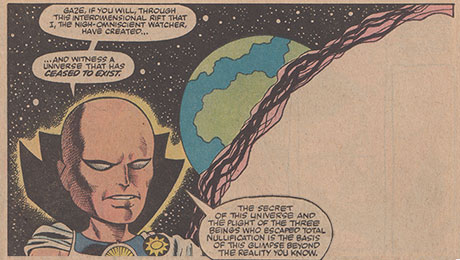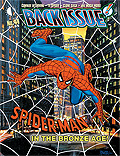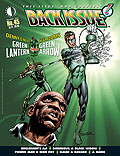The Man of Steel #1 (October 1986)
"From Out of the Green Dawn"
John Byrne-Byrne/Dick Giordano
Doug: As many of us had said earlier, I was surprised during our recent round of Bracketology that Crisis on Infinite Earths bested the deaths of Gwen Stacy and the Green Goblin in the semi-finals. Today we'll begin a six-week examination of the fall-out from the Crisis -- the re-imagining of Superman, as told by John Byrne in the bi-weekly series The Man of Steel. Byrne was among the hottest creators in comics in 1986, having come off of lengthy runs on the X-Men and Fantastic Four. DC Comics wasn't afraid to go after some big names for their revisionist histories, handing the reins of the revamps to Byrne, Frank Miller (Batman), George Perez (Wonder Woman), Green Arrow (Mike Grell), Hawkman (Tim Truman), and the Justice League (J.M. DeMatteis/Keith Giffen/Kevin Maguire). Obviously you're sitting there reading a blog about the Bronze Age -- this series will look at what came next, for better or for worse.
Karen: I haven't looked at this series in a very long time. I don't recall feeling strongly one way or another when I read it originally. My main concern was that Superboy had been wiped out of existence, and that affected the Legion. I've never been a Superman fan.

Doug: That's an excellent point, and one that made me sad. Personally, I quit buying the Legion after
Superboy #259 when little Clark got kicked out of his own book. To be honest, that time coincided with my cold turkey dropping of all comics, but I'll admit that I was very concerned that the Legion was going it alone after that story.
Karen: Well, the Legion's never been the same since Crisis, but that's a discussion for another time.
Doug: I'll be reading and scanning from the original issues, but did want to mention that I was a winner in the trade paperback raffle back in 1987. As I recall, readers could submit entries to each of the Superman mags being published at that time:
Superman,
Adventures of Superman, and
Action Comics. I think I sent in 3-4 entries to each comic. How surprised do you think I was to get an unexpected package at college one day? I could not believe it! In case you've never seen one, DC basically bound the six issue mini-series. The stock used is the same as DC's covers and interior pages were printed on.
Karen: You lucky guy! I dug out my comics for this one.

Doug: Our story is divided into three parts: a prologue and two chapters. We pick it up on a Krypton far different from the one depicted by Wayne Boring, Curt Swan, et al. This is a highly advanced/evolved Krypton, where human emotion has been squelched for centuries. The Kryptonians are masters of their planet, controlling every aspect of their lives -- even down to when it rains. We meet Jor-el, a scientist troubled by impending events on his planet. Jor-el is served by two small robots (droids) who have the ability to converse with him and each other, and to follow directives. One says to the other that their master seems troubled; the response is that while all Kryptonians have been acting apprehensively, it is not in the programming to know why. This is our first clue that there seems to be little emotion on this planet.
Karen: Yes, this was certainly not the Krypton I was familiar with, although my knowledge of Superman and his mythos mostly came from the Superman films and my uncle's 50s and 60s Superman comics. That Krypton was also technologically advanced, but seemed a much warmer, human place. Byrne's decision to go with a cold, sterile version of Krypton seems an odd choice. Jor-El and Lara's wardrobes reflect this as well -almost every inch of skin is covered.

Doug: We see Jor-el next standing in front of a globe, or pod. He had instructed his servants to place "the matrix" within an orb in his laboratory. As he reaches out a hand toward the encased fetus, the Lady Lara enters. It's pretty obvious that although they are married and this is their child, there was no sexual contact whatsoever in the creation of the baby. Jor-el speaks of Krypton's impending doom, and of a civilization failed. Lara rebukes him, and questions his speech as archaic. But Jor-el tells her what he knows: the planet is going to explode due to pressures rising within its crust. While the matrix could not survive, even in the pod, it could survive after a journey through hyperspace. Lara is incredulous, but we're again aware that there doesn't seem to be a real motherly attachment. Jor-el says that he has scanned the heavens and found a suitable planet for which to send the baby -- Earth. He shows Lara an image of middle-America, and she recoils at the site of a bare-chested farmer. Again, it's obvious that any coupling between Jor-el and Lara took place in a test tube.
Karen: This lack of humanity and feeling (Jor-El is an anomaly) makes the death of Krypton seem a bit less sad -call me insensitive but the Kryptonians don't seem to be really living.

Doug: I think it's interesting that in wiping away the 50-year backstory of Krypton, we're left only with these few sterile images. I suppose we are to assume that they could do anything, so whether or not ore was their industry or service-type jobs is a moot point. This is it, face value.
Doug: Jor-el says that due to the energy of Earth's yellow sun, the child will grow up with extraordinary powers; Lara interprets that as her superior Kryptonian son subjugating the savages of Earth's primitive culture. Jor-el is a bit more open-minded. Suddenly the eruptions begin to ravage Krypton's surface. Jor-el wastes no time in launching the escape pod. As it leaves, the planet begins to quake and groan; Jor-el says to Lara that he is glad that they will face the end in each other's company. As the rocket exits, the planet indeed explodes, and we see a small shard of Krypton reaching the tail of the rocket, and lodging itself there.
Karen: Ah yes, foreshadowing...

Doug: Chapter One opens on a high school football field, where young Clark Kent is leading his team to victory -- by scoring his 10th touchdown of the game! This ain't yer daddy's Clark Kent! We meet Jonathan Kent, near the sideline as the Smallville coach is about to explode in the "thrill of victory". Yet Pa Kent seems a bit dour. The game ends, and Clark comes off the field on his classmates' shoulders. But his teammates don't seem as jubilant. Pa steps forward and interrupts Clark before he leaves with his friends. Clark initially offers to talk later, but Pa's having none of it. They eventually leave the school, as some clouds start to roll in. Pa said it was time they had a talk, and begins to relate a story we are by now very familiar with: how Jonathan and Martha Kent saw a bright light in the Kansas sky, followed it out to one of their fields, found a rocket ship with a baby inside, and adopted the child. John Byrne adds a few updates along the way, such as (I believe) the blizzard that crippled the heart of Kansas for an entire winter; it wasn't a tough sell to the townsfolk when Martha appeared in the spring with a new baby.
Karen: Both when I first read this, and now, I found it odd that Clark was a super-star athlete. I know Byrne was trying to differentiate his version of Clark from what had gone before, but it just doesn't make sense to me that his parents, knowing his vast power, would allow him to potentially harm other kids. The idea that Ma and Pa had to take Clark aside and tell him that he had to pretend to be a nerd, basically, seems much more likely.


Doug: We then see young Clark start to mature, from a toddler to an elementary-aged child. Along the way there are amazing feats, miracles, and other just unexplainable incidents that occur. While Jonathan and Martha realize that something is amiss, they try to keep Clark as grounded as possible. This explains why as a teen Clark was proud of his accomplishments on the gridiron, but wouldn't be characterized as big-headed. I think in this "origin" section of the origin story, Byrne crafts for the reader the roots of Superman as the "Boy Scout", fighting for "truth, justice, and the American way". It's pretty obvious that he's been raised with "Midwestern values", and has taken this teaching to heart. Eventually Clark realizes that he can fly -- for a really nice rendition of a man suddenly able to leave the ground, I'd encourage you to see Kurt Busiek's and Stuart Immonen's
Superman: Secret Identity. As we take leave of the site where Jonathan had hidden the rocket ship, we see Clark suddenly take ill. Of course, we know it's due to the chips of his home planet, stuck throughout the nooks and crannies of the ship. But, who is the mystery man lurking in the shadows on this rainy Friday evening?
 Karen: I got a different impression of Clark here, in that I did feel he was egotistical and a bit of a jerk. However, by the time Pa has explained things to him, he's talking about his responsibilities to the world. This seemed like an awful fast u-turn to me. I just didn't buy it.
Karen: I got a different impression of Clark here, in that I did feel he was egotistical and a bit of a jerk. However, by the time Pa has explained things to him, he's talking about his responsibilities to the world. This seemed like an awful fast u-turn to me. I just didn't buy it.
Doug: Clark's personality as an adolescent is not revisited, so the adult altruistic Clark is all we'll have to work with. We enter Chapter Two in the Kent kitchen as Jonathan comes down for breakfast. Martha has her scrapbooks out, and muses over all of the headlines Clark has generated through his activities over the past seven years. Seven years! I guess I was a bit surprised that Byrne chose to make Clark 25 in this story. I don't know if I felt he should have been older or younger, but once Superboy was taken out of the equation the age of 25 does seem to be a bit old for a Super-debut. As Jonathan opens his daily paper, he sees yet another headline of a mysterious "Superman" who saved a disabled space plane. Suddenly, there are creaks in the floor boards above them -- in Clark's room! Hustling up the steps, shotgun in hand, Pa and Ma burst into the room to find... a brooding Clark. Clark's depressed and confused, and begins to relate what had happened as the space plane had gotten into trouble.
 Karen: It's much like what happens in the original Superman film, isn't it? Except there's no trip to the Arctic. Also, check your glasses pal: that's no shotgun -looks more like an ax handle to me.
Karen: It's much like what happens in the original Superman film, isn't it? Except there's no trip to the Arctic. Also, check your glasses pal: that's no shotgun -looks more like an ax handle to me.
Doug: Obviously you've never been to Smallville and checked out an artillery store. Actually you caught me trying to write from memory without opening the book back up. Duh to me. And really, it looks like a large utensil for use with a cauldron suspended within a fire place. We use those all the time... But we can go with ax handle.
Doug: In flight over Metropolis, everything seemed to be going well when suddenly a small civilian craft got too close and clipped the tail of the space plane (this is obviously pre-9/11, as any craft like that would be taken out of the sky by an F-16 escort). Clark had been in the crowd of spectators watching in horror as the big vessel tipped and began its nosedive. Streaking up from the ground, with no concern for his secret identity, Clark was able to right the plane. However, little did he know that onboard was not only the crew, but intrepid reporter Lois Lane. As the plane was stabilized and brought in for a landing, the crew had become aware that it was a flying man who was saving them. Never one to miss a story, Lois was first off the plane and accosted our young hero with a "Hold it right there, Buster!" Clark was taken aback, so much so that he didn't fly off. Their eyes met, a little chemistry began to brew, and then the crowds set in. The sense of claustrophobia was more than Clark could take.
 Karen: Again, I had a feeling of deja vu for the Superman film, as Clark saves the plane here too. Although no one here said, "We got something. I'm not saying what it is, but trust me." I like Lois' look here -in fact, Byrne does a nice job with both Lois and Clark. Giordano's inks really complement his pencils.
Karen: Again, I had a feeling of deja vu for the Superman film, as Clark saves the plane here too. Although no one here said, "We got something. I'm not saying what it is, but trust me." I like Lois' look here -in fact, Byrne does a nice job with both Lois and Clark. Giordano's inks really complement his pencils.
Doug: With
Man of Steel, I think it was safe to say Byrne felt that the
Superman movie was canon. Back in Smallville, Ma stitched a garment on her sewing machine as Pa and Clark entered the room. What we are seeing is a quick-hitter in the evolution of the Superman costume. Pa and Clark made the famous shield, while Ma came up with the color scheme. Ma also gets credit for noticing that clothes worn close to the skin never seemed to tear when Clark was playing as a child -- hence the skin-tight costume. She also gets credit for the boots. Pa came up with that brilliant disguise of wearing... eyeglasses with slicked-back hair. Uh huh. And then we get what can only be called a majestic last-page splash. Wow.
 Karen: The idea that Superman has some sort of a protective force shield close to his skin I think originated with science fiction writer Larry Niven, of whom I have heard Byrne is a big fan. Niven is a proponent of the idea that all of Superman's abilities are really mental-telekinesis for flight and super-strength, force field projection for invulnerability, etc. We see this idea put to use by Byrne for the character of Gladiator when he had him appear in Fantastic Four. I don't think it was ever really stated that this was true for all of Superman's powers in the Byrne run though. And yes, you just have to roll your eyes and accept that no one can tell Clark and Supes are the same guy.
Karen: The idea that Superman has some sort of a protective force shield close to his skin I think originated with science fiction writer Larry Niven, of whom I have heard Byrne is a big fan. Niven is a proponent of the idea that all of Superman's abilities are really mental-telekinesis for flight and super-strength, force field projection for invulnerability, etc. We see this idea put to use by Byrne for the character of Gladiator when he had him appear in Fantastic Four. I don't think it was ever really stated that this was true for all of Superman's powers in the Byrne run though. And yes, you just have to roll your eyes and accept that no one can tell Clark and Supes are the same guy.
Doug: I really got excited re-reading this story for the review. It brought back a lot of memories I'd not felt in 25 years. I've talked often on the blog about my love of Superboy and utter disdain for Superman. But here, in this series, was a Man of Steel I could begin to embrace. Byrne grounded Clark Kent in the real world and brought his power levels down to the point where he was no longer a god. This was infinitely more appealing than his Silver Age personna as a do-everything. I just liked this a lot better. And overall, this sense of newness running throughout the DC Universe was very fresh, a true jumping-on point.
 Doug: Welcome to Fantasy Island, kiddies! Today's Open Forum asks you to put on your "What If? Well, Why Not?" thinking cap and come up with some alternate scenarios to well-known events. And, if you want to extend it, shoot -- give us a one- or two-year plot outline!
Doug: Welcome to Fantasy Island, kiddies! Today's Open Forum asks you to put on your "What If? Well, Why Not?" thinking cap and come up with some alternate scenarios to well-known events. And, if you want to extend it, shoot -- give us a one- or two-year plot outline! Doug: Over in Amazing Spider-Man, we all seem to mark time with the deaths of Gwen Stacy and the Green Goblin. Past the Bronze Age, there was the introduction of the black costume. Was the introduction of the All-New, All-Different X-Men the biggest game-changer of them all?
Doug: Over in Amazing Spider-Man, we all seem to mark time with the deaths of Gwen Stacy and the Green Goblin. Past the Bronze Age, there was the introduction of the black costume. Was the introduction of the All-New, All-Different X-Men the biggest game-changer of them all?



























































































